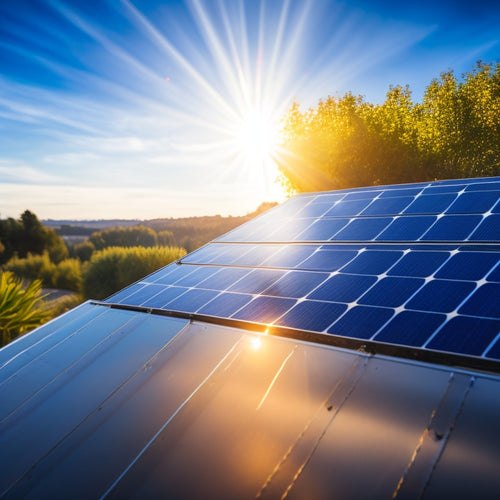
3 Essential Off-Grid Battery Care Tips
Share
To get the most out of your off-grid batteries, you'll want to monitor your state of charge regularly to prevent damage and guarantee peak performance. Avoid deep discharging cycles, which can greatly reduce lifespan and performance, by maintaining a state of charge between 20% and 80%. Additionally, store your batteries in a cool, dry environment to prevent damage from extreme temperatures and moisture. By following these essential care tips, you'll be able to identify potential issues early on and extend the lifespan of your batteries - and grasping these fundamentals will reveal even more understanding into optimizing your off-grid energy system.
Overview
- Regularly monitor state of charge to prevent damage, ensure peak performance, and identify potential issues early.
- Avoid deep discharging cycles by maintaining SOC between 20% and 80% to minimize wear and tear.
- Store batteries in a cool, dry environment (50°F to 70°F) to prevent damage, sulfation, and corrosion.
- Set voltage alerts to prevent deep discharging and maintain a healthy charging cycle.
- Keep track of charging cycles, voltage, and temperature to identify patterns and anomalies that may indicate potential issues.
Monitor State of Charge Regularly
Since you're relying on your off-grid battery bank to power your daily needs, monitoring its state of charge (SOC) regularly is crucial to confirm peak performance, prevent damage, and prolong its lifespan.
You can't afford to guess when it's time to recharge or risk over-discharging. Accurate battery monitoring guarantees you stay on top of your energy storage.
Regular checks on SOC prevent excessive deep discharging and help identify patterns and anomalies that can indicate potential issues.
Look for state indicators like voltage, temperature, and charging cycles to get a thorough overview of your battery's health.
Invest in a reliable battery monitoring system that provides real-time data, so you can make informed decisions about your energy usage.
Avoid Deep Discharging Cycles
As you rely on your off-grid battery bank to power your daily needs, avoiding deep discharging cycles becomes critical to prolong its lifespan and maintain peak performance.
You can achieve this by adopting good charging habits, such as setting voltage alerts to prevent deep discharging and monitoring charge cycles to identify potential issues early.
Aim to keep your batteries between 20% and 80% state of charge as much as possible. This will reduce the wear and tear on your batteries, ultimately extending their lifespan.
Deep discharging can cause irreversible damage, reducing your battery's capacity and overall performance.
Store Batteries in Cool Dry
During prolonged periods of inactivity, storing your off-grid batteries in a cool, dry environment becomes vital to maintaining their overall health and performance.
You'll want to keep your batteries away from direct sunlight, moisture, and extreme temperatures. Regular maintenance is essential, as regular solar battery checks can identify early warning signs of degradation and prevent sulfation and corrosion.
Temperature effects can greatly impact your battery's lifespan, with high temperatures accelerating degradation and low temperatures slowing down chemical reactions. Make sure you provide proper battery insulation to regulate temperatures between 50°F and 70°F (10°C and 21°C).
A cool, dry environment will help prevent corrosion, reduce self-discharge rates, and maintain your battery's capacity. By storing your batteries in a controlled environment, you'll be able to extend their lifespan and guarantee they're ready to perform when you need them.
Frequently Asked Questions
How Often Should I Equalize My Off-Grid Batteries?
You should equalize your off-grid batteries every 1-3 months, depending on usage and temperature, as part of regular battery maintenance to prevent sulfate buildup and guarantee peak performance and longevity.
Can I Mix Old and New Batteries in My Off-Grid System?
Can you really risk mixing old and new batteries, only to see your off-grid system fail? You shouldn't, as battery compatibility concerns arise when mixing battery types, affecting performance, longevity, and overall system reliability - it's just not worth the gamble.
What Is the Recommended Battery Type for Off-Grid Systems?
When choosing a battery for your off-grid system, you'll want to evaluate lithium's advantages, such as higher energy density and longer lifetimes, but also weigh lead acid considerations, like upfront cost and maintenance requirements, to find the best fit for your freedom-seeking lifestyle.
Can I Charge My Off-Grid Batteries With a Generator?
You're not stuck in the dark ages, you can charge your off-grid batteries with a generator, but beware, not all generators are created equal - make certain yours is compatible and optimized for battery charging to avoid damaging your system.
How Long Do Off-Grid Batteries Typically Last With Proper Care?
You'll typically get 5-15 years of life from your off-grid batteries with proper care, depending on factors like depth of discharge, temperature, and maintenance best practices, which you'll want to excel in to maximize your battery lifespan and guarantee energy independence.
Ready to Buy
Carefully craft your off-grid battery care routine to guarantee a prolonged power performance. By monitoring your state of charge regularly, avoiding deep discharging cycles, and storing batteries in cool dry conditions, you'll cultivate a culture of careful maintenance. Consistently follow these vital commands to conserve capacity, curb corrosion, and control chaos, ultimately keeping your off-grid operation running smoothly and efficiently.
Related Posts
-

Top Eco-Friendly Camping Equipment for a Sustainable Adventure
When you're camping with the planet in mind, opt for eco-friendly gear like tents made from recycled materials and bi...
-

How to Achieve a Zero-Waste Lifestyle for a Greener Tomorrow
To achieve a zero-waste lifestyle, start by adopting the principles of refusing, reducing, reusing, and recycling. Sw...
-

How Efficient Are Thin Film Solar Cells
Thin film solar cells provide an innovative approach to energy generation, boasting efficiency rates generally betwee...


